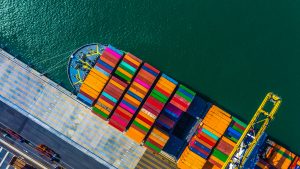Extruded aluminum imports fraudulently misclassified as warehouse pallets to evade anti-dumping and countervailing (AC/CVD) duties
A group of California companies affiliated with C hinese Billionaire Liu Zhongtian—known as “Uncle Liu” or “Big Boss”—have been ordered to pay the U.S. government $1.83 billion in restitution after having been convicted of a scheme to evade customs duties on imports of Chinese aluminum. The judgment is believed to be one of the largest in U.S. history involving customs fraud.
hinese Billionaire Liu Zhongtian—known as “Uncle Liu” or “Big Boss”—have been ordered to pay the U.S. government $1.83 billion in restitution after having been convicted of a scheme to evade customs duties on imports of Chinese aluminum. The judgment is believed to be one of the largest in U.S. history involving customs fraud.
On April 11, 2022, United States District Judge R. Gary Klausner sentenced the affiliated warehousing and aluminum companies to five years probation and ordered them to pay the $1.83 billion. The sentence followed a trial in August 2022 where the defendants were convicted of conducting a scheme with Zhongtian and others to evade U.S. anti-dumping and countervailing duties (AC/CVD) on extruded aluminum products from China. The jury found the defendants guilty of conspiracy, wire fraud, and passing false and fraudulent papers through a customshouse.
The U.S. government imposes anti-dumping and countervailing duties to level the playing field for domestic industries when foreign competitors receive subsidies or other financial benefits from their home countries, or when they sell their products in the United States at prices below “normal value.” In 2011, the U.S. Department of Commerce ordered AC/CVD duties of up to 400% on certain extruded aluminum products from China.
Imports fraudulently misclassified
Pursuant to the scheme, from 2011 to 2014, the defendants disguised and falsely misclassified imports of extruded aluminum subject to the AC/CVD duties as aluminum warehouse pallets, which, as supposedly finished aluminum products, were at that time not subject to U.S. tariffs, according to the U.S. Department of Justice. The extrusions were spot-welded together to make them appear to be pallets and, after importation, stockpiled by the defendants in warehouses in California and New Jersey.
The Zhongtian-controlled entities then sought to develop aluminum melting facilities in the United States to transform the supposed pallets into forms of aluminum that were more commercially valuable, the U.S. Department of Justice said.
The U.S. government also charged Zhongtian in connection with the scheme. In addition to probation and the $1.8 billion in restitution, the remedies ordered by the court included the seizure of the warehoused aluminum, worth approximately $70 million. In 1993, Zhongtian founded China Zhongwang Holdings, which has become one of the largest aluminum extrusion companies in Asia.
Custom fraud whistleblower claims under the U.S. False Claims Act
Although the Zhongtian matter involved criminal charges, the knowing evasion of import duties or tariffs also violates the U.S. False Claims Act, which imposes substantial civil liabilities—three times damages, plus civil penalties—on parties that defraud U.S. government agencies like U.S. Customs and Border Protection (CBP). The whistleblower provisions of the False Claims Act—also called the “quit tam” provisions—entitle private parties to bring lawsuits on the U.S. government’s behalf and share in the proceeds. Specifically, qui tam whistleblowers stand to receive awards of 15%-30% of any government recovery.
Customs fraud qui tam lawsuits are generally brought by employees or ex-employees of violators, as well as by honest business competitors unfairly disadvantaged by rivals cheating on their customs duties. Whistleblowers can be from any country.
Customs frauds generally fall into three categories—(i) the misdeclaration of the “country of origin” or transshipment, typically to evade Section 301 trade-war tariffs, (ii) the use of phony or doctored commercial invoices to undervalue the imports, and (iii) the use of erroneous Harmonized Tariff Schedule (HTS) classifications to reduce the duty rate or avoid AD/CVD duties. The Zhongtian case involved HTS misclassification, among other fraudulent conduct.
Speak to whistleblower lawyer Mark A. Strauss
Mark A. Strauss Law PLLC, a whistleblower law firm, encourages potential customs fraud whistleblowers to contact whistleblower attorney Mark A. Strauss for a free consultation if they have information regarding the knowing evasion of import duties or tariffs, including Section 301 tariffs on Chinese goods.
 The Whistleblower & Anti-Fraud Blog
The Whistleblower & Anti-Fraud Blog

